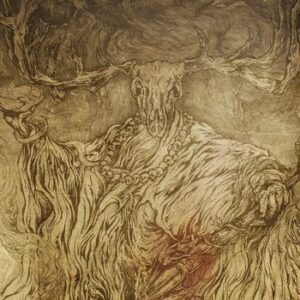Recorded in 2010 but left unmixed and un-mastered until now, ‘Fragments from the Aethyr’ marks the return of Funerary Call, purveyors of terror-drenched blackened ambience. Featuring only three tracks and clocking in at just shy of forty minutes, this is a white-knuckle ride to the outer rim of fear that will appeal to fans of Sunn 0)), Asva and Skullflower with its screeching, avant-garde violin, echoing percussion and non-linear progression. This is truly the music of the damned, a sprawling exercise in fear-inducing atmospherics crafted by damaged minds and catering to a small, but devoted, minority who masochistically enjoy having their nerve-endings comprehensively shredded.
Eschewing typical musical constructs, Funerary Call have no interest in crafting music that is immediate, or even recognisable in conventional terms as music. Rather this blistering triptych of tracks smoulder and burn in the dark, occasionally bursting into static-drenched flame, white noise threatening to obscure the music altogether and plunge the listener head-long into a ‘metal machine music’ feedback frenzy, only for it to abate at the last moment, the squealing violin tearing holes in the barrage of noise and grounding you before you teeter over the edge into the waiting abyss. As first track ‘libation’ slowly draws to a close, fading out over echoing notes, the imagination starts to run riot, particularly if you’re enjoying the album in the gloom of dusk with the fading light providing the perfect backdrop to the unsettling music Funerary call creates, and then the horrific ‘fragments’ fades into your consciousness. A sweet violin echoing in the darkness it should be relaxing, but something about the way it’s being played speaks not of light and laughter, but of rot and decay and concatenated corpses slowly bleeding their fluids back into the earth. It’s hard to pin point exactly what elements are being introduced – perhaps the hint of bass, or the violin’s off-kilter and increasingly out-of-control wailing recalling nothing so much as the onset of hysteria, but whatever techniques are being employed, the result is a black ambience that creates a near physical feeling of discomfort and concern. Like watching an intelligent horror film that understands that blood and injury is far more terrifying in the anticipation than in the realisation, Funerary Call’s inhuman restraint is a large part of what makes their subtle soundscapes so unerringly effective and listening to the record is an experience that is both terrifying and utterly engrossing.
Final track ‘transference from the void’ builds upon ‘fragments’, initially dispensing with the violin and slowly introducing the deeply disconcerting throat singing of Ross Birdwise before the scraping strings and echoing percussion slowly crawls back in, fingers of ice running up your spine as you become drawn ever deeper into the hellish, alien world Funerary Call have created. There is beauty here, but it is an inhuman, dangerous beauty that threatens even as it attracts, and that feeling of danger pervades the atmosphere, turning it corrosive and foetid as the track progresses.
This is music for but a select few, and certainly not intended for mass consumption. As ever Crucial Blast have taken great care to make sure that this artistic piece has been beautifully packaged so that the listener can fully appreciate the experience that Funerary Call have created, the album coming packaged in a handsome digi-pack adorned with ‘Cernunnos, an illustration crafted by the exceptionally talented Orryelle Defenestrate-Bascule (find out more here: www.crossroads.wild.net.au/esoterotica.htm ) but it is the music, first and foremost, that draws the attention and, for such a harrowing experience, the album passes in a heartbeat, the near-forty minute run-time dissipating leaving you feeling strangely elated as if you’ve passed through a traumatic experience and emerged the stronger for it. Like all things music is very open to interpretation, and it is undeniable that you will experience your own version of my encounter with ‘Fragments from the Aethyr’ but what is clear is that this is a musical experience which caters to the imagination, a rare treat in these days of excessive exposition, and it is a worthwhile experience indeed.




